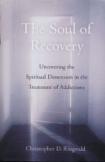Keep the Faith
This is an important book. Christopher Ringwald makes strikingly clear that spirituality is the “soul of recovery” from addiction. Through interviews and research, he shows that addicts have for over a century found the way to sobriety and to a positive contribution to society through some form of belief. “The behavior behind addiction and recovery consists of choices. Choices are based on values, values on morality and beliefs and these on the core, or soul, of a person. Any lasting solution needs to touch the person there.” The main route toward healthy choices for most recovering addicts has been through some form of 12-step program. All such programs are based on a fundamental conversion of thought, feeling and behavior. They begin with the recognition of one’s powerlessness, that one is not God, and then turn to a “higher power” for help to overcome one’s powerlessness. They are, namely, spiritual programs.
Our society, however, is leery of bringing religion or spirituality into the public square. Doctors, medical researchers and perhaps the general public hope to find the “magic pill” that will remove the addiction from a person. Addiction is a problem of “faulty genes,” “crossed wiring” or “poor metabolism,” a disease that science will someday cure, many implicitly hold. Ringwald, who directs the Faith and Society Project at the Sage Colleges in Albany, N.Y., detects hostility or discomfort about spirituality among researchers on addiction, which shows itself in the lack of research on the spiritual dimension of recovery. “A reader” of research on addictions “would hardly know that it is a person who picks up or declines a drink or drug.” Yet, as Ringwald notes, even if a pill is found that reduces or removes entirely the craving for alcohol or drugs, the addict will have to make the choice to take it. In other words, spirituality will come into play in his or her recovery.
Ringwald notes the paradox in much of the 12-step literature on recovery. On the one hand, the addiction is seen as a sickness or disease over which the addict has no control. The first step is to admit one’s powerlessness to overcome the addiction. On the other hand, the literature maintains that the addict is free to admit powerlessness and to choose to ask help from his or her “higher power” and the fellowship of recovering addicts. As I pondered this paradox, I thought that it might be resolved this way. If I am an addict, I am free to take a drink or a drug or not. But if I do take the drink or drug, I become much less free to stop using the drug. The key to the success of 12-step programs is to help addicts to bolster the freedom to say no to the drug in the first place.
The Soul of Recovery is, among other things, a guided tour through a variety of treatment programs in the United States. In separate chapters Ringwald takes up middle class and mainstream treatment, women’s treatment and spirituality and Native American treatment and spirituality. Two chapters deal with the difficulties of hard-core addiction and show the practical ways in which spirituality at the least reduces harm to both the addict and society. Each chapter features one or two profiles of recovering addicts and relates how they came to their present state. Many of these are moving tributes to the power of some kind of belief, even if it is only belief in the treatment group.
In the final chapter Ringwald takes up the issue of faith-based solutions in a democracy. How does our society promote recovery from addiction without promoting a particular religion or faith? Any spiritual program of recovery is based on some form of belief. The author writes: “...we can grant belief a role without promoting religion or even God. Simply to recognize that a person has a spiritual dimension does not breech the freedom to believe or not, to worship or not, or to just be left alone.” He argues that the spiritually based recovery movement has, for many years, been able to help addicts without violating the Constitution’s “wall of separation.” This movement provides a faith that works by helping addicts to give up being their own god in favor of a “higher power” of their own choice.
The book is not without flaws. Typos and grammatical mistakes are surprisingly numerous for a book published by such a prestigious press. At times the reportorial style gets in the way. Descriptions of cities and neighborhoods seem out of place, for example, and some of the profiles of addicts wander from the point they are meant to illustrate. The book’s structure eluded me; I was not sure why chapters followed one another. Nonetheless, the book is an important contribution to the necessary task of bringing a discussion of the spiritual dimension of the human into the marketplace.
This article also appeared in print, under the headline “Keep the Faith,” in the October 7, 2002, issue.








